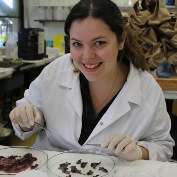A Murdoch University researcher has found a range of pathogenic bacteria and parasites which can have serious consequences if transmitted to humans in feral cats and black rats on Christmas Island.
Narelle Dybing from the School of Veterinary and Life Sciences found the bacteria Leptospira, which can cause Weil's disease and Bartonella, which can lead to cat scratch disease.
Both of these disease-causing bacteria are zoonotic, meaning they can be transmitted from animals to humans if they come into close contact with one another. Whilst infection with Leptospira and Bartonella can result in initially indistinct symptoms such as fever, headaches, chills and muscle aches, further progression can be much more serious, leading to jaundice, swollen lymph nodes and even organ failure in humans.
Ms Dybing, who is investigating infectious diseases for her PhD at Murdoch University, said: "Zoonotic strains of Leptospira are most commonly transmitted to humans from dogs and black rats; however, in our study we detected human pathogenic Leptospira in 43 per cent of cats tested on Christmas Island.
"Flying foxes have also been shown to carry and shed Leptospira; however, it is unknown if the Christmas Island flying fox – the one remaining native mammal on Christmas Island – carries Leptospira.
"It is transmitted in urine, so people who do water sports can be at risk. The beginning symptoms are like the flu for humans – so it can be under-detected because of this. The illness in humans is treatable but it has to be identified early. Many animals seemingly carry it with no ill effects."
Ms Dybing also found Bartonella koehlerae in a feral cat in the south west of WA. This was the first case of this pathogenic bacterial species in the southern hemisphere.
Bartonella koehlerae is pathogenic to humans, commonly causing severe immune responses and swollen lymph nodes, and in severe cases heart issues and hallucinations. "Human infections of Bartonella koehlerae have recently been reported from the US and Iran," said Ms Dybing.
Rat lung worm, or Angiostongylus has also been found by Ms Dybing on Christmas Island. She said none of her samples from mainland WA were positive for this parasite, but there have been several cases reported from the eastern states of Australia.
"There are suggestions that on Christmas Island the African Giant Snails carry rat lung worm," she said. "It can be transmitted to humans via unwashed vegetables such as lettuce and through accidentally ingesting snails. In humans it causes brain swelling and other neurological issues, and can even be fatal."
Ms Dybing's study has investigated animals on Christmas Island, Dirk Hartog Island in Shark Bay and the south west of WA.
She said many zoonotic pathogens found in animals in the south west of the state were particularly significant because of the increasing overlap of urban areas and natural habitat.
"Increasing interactions between domestic animals and both native and introduced wildlife can give rise to increased disease transmission. As such, a greater awareness and appreciation of the diseases these animals can both carry and transmit is an important step towards maintaining robust public health, particularly in peri-urban and rural areas," she added.
"This research emphasizes the importance of basic hygiene including hand washing and reducing contact with wild animals as well as checking yourself for ticks or other ectoparasites. If you are worried, see your doctor."
Provided by Murdoch University






















